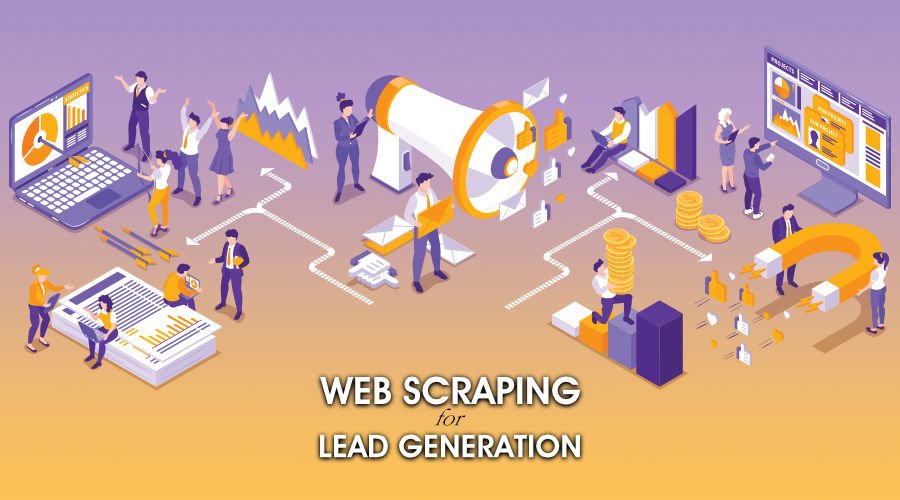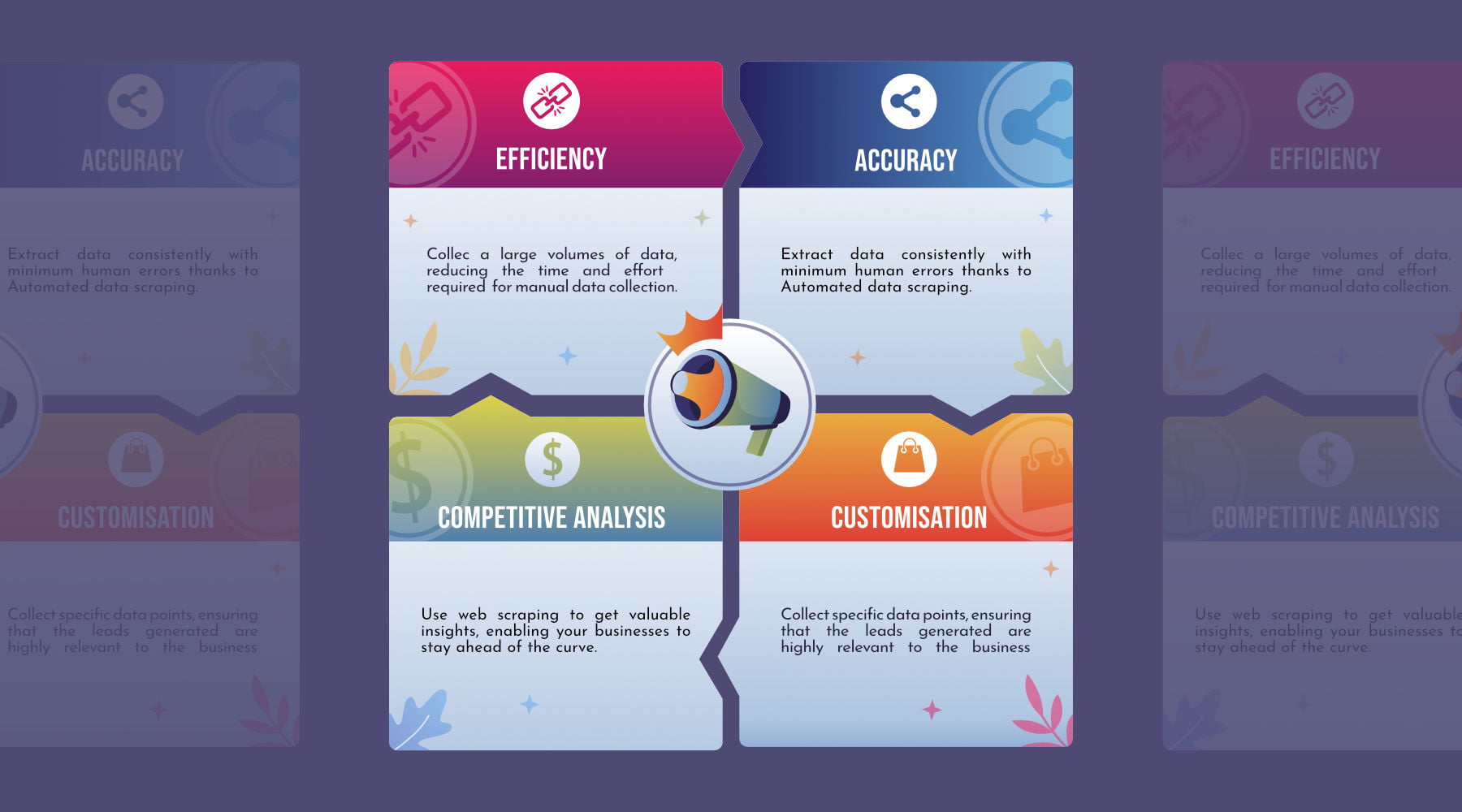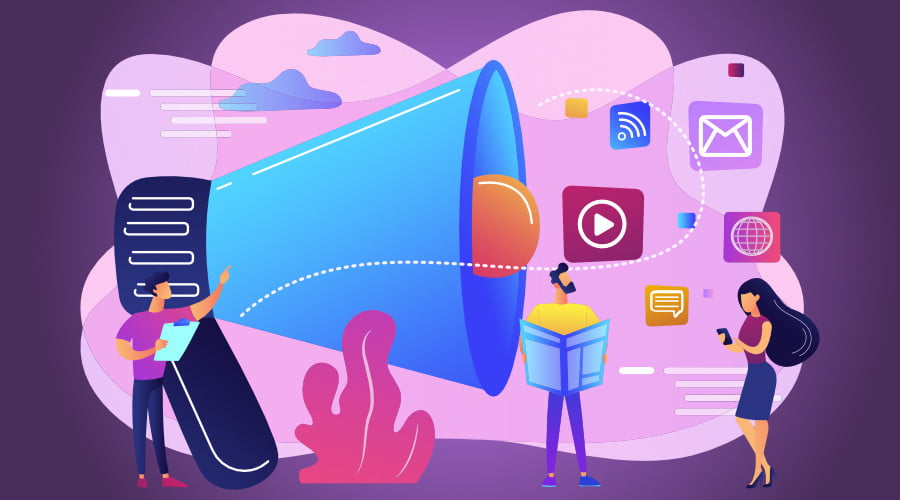
The world of marketing and sales is constantly evolving, with new technologies and methods emerging every year. One of these innovations is web scraping, a technique that has become increasingly popular for lead generation.
In this article, you will learn the basics of web scraping and lead generation, how to use them together, and real-world lead generation examples through web scraping.
What Are Web Scraping and Lead Generation
Web Scraping (or Data Scraping)
Web scraping is a technique that extracts information (often unstructured) from websites and transforms it into structured data for easy analysis and use. You can do this through various tools and programming languages such as Python, Java, and PHP. Data can be collected on anything, from product prices and descriptions to customer reviews and contact information.
Lead Generation
Lead generation is the process of identifying and attracting potential customers or clients. You can do that through email marketing, social media, search engine optimisation, and targeted advertising. The goal is to convert these leads into paying customers, thus generating revenue for your company.
Lead Generation Through Data Scraping
The present and future of marketing and sales
Traditional lead generation methods, such as cold calling and manual data collection, are time-consuming and labour-intensive. As a result, many businesses are turning to web scraping as a more efficient and effective method for generating leads.
Advantages of Lead Generation Scraping

- Efficiency. Web scraping allows for the rapid collection of large volumes of data, reducing the time and effort required for manual data collection.
- Accuracy. Automated data scraping ensures that information is extracted accurately and consistently, minimising the risk of human error.
- Customisation. Web scraping tools can be tailored to collect specific data points, ensuring that the leads generated are highly relevant to the business.
- Competitive analysis. Web scraping can provide valuable insights into competitors, enabling businesses to stay ahead of the curve.
Lead Generation Scraping Challenges
- Legal and ethical concerns. Web scraping can potentially violate copyright and privacy laws. So, the web scraping and lead generation services you choose must perform data collection in compliance with international and local regulations and practices.
- Website structure changes. Websites may change their structure over time. This can affect the web scraping process and require adjustments to the scraping tools. A professional data scraping service and team constantly monitors such changes and adjusts the extraction script. If you use a self-service tool, it will notify you about the need for revision.
- Captchas and anti-scraping measures. Some websites implement measures to prevent automated data collection, making web scraping more challenging. A competent web scraping company or professional knows that and always integrates tools and uses the techniques to overcome this issue, such as proxy services, IP rotation, requests frequency, etc.
You may be interested also in knowing the Top 9 Data Mining Applications and Benefits in the Real World 2023.
Leads Scraping Real Examples (strategies and websites)
B2B Leads Scraping from Business Directories
If you are in business and know the Internet basics, for sure you are aware of business directories. There are plenty of choices (from generalistic to niche directories), and we suggest you use the most relevant to your business. Here is a short list of the top business directories to scrape for online lead generation.
- Google Maps
- Google My Business
- Apple Maps
- MapQuest
- Yellow Pages
- Yelp
- LinkedIn Company Directory
- HubSpot Solutions Directory
- Better Business Bureau
- Bing Places for Business
- Foursquare
- Angi (formerly Angie’s List)
- Manta Business Directory
- Thumbtack (home management platform)
- Merchant Circle
- Niche business directories
- And many more.
B2C Leads Scraping for E-Commerce
B2C businesses can use web scraping by collecting data on customer reviews, FAQs, and opinions on various platforms, such as Amazon (and other online marketplaces and shops), forums, and Real Estate websites.
Data scraping tools and services designed for lead generation help you collect data on potential buyers, sellers, and renters from real estate websites and listings, enabling your enterprise to generate highly targeted leads.
Leads From Social Media
Social media platforms can be a goldmine for lead generation with web scraping across industries. You can employ web scraping techniques to extract valuable data from platforms like LinkedIn, Twitter, Facebook, Instagram, and Telegram.
For example, on LinkedIn, scraping can collect information on potential clients or partners based on job titles, industries, or company size. Twitter can provide insights into trending topics and conversations related to your business, allowing you to identify influencers or potential customers. Similarly, Facebook and Instagram contain data on user demographics, interests, and behaviours, while Telegram can offer access to niche groups and channels where potential leads may congregate.
Therefore, by harnessing the power of web scraping on social media platforms, your business can tap into vast networks of potential leads that may have been otherwise difficult to reach.
Leads From Freelance Platforms
Finding professionals, jobs and projects for bidding
As the gig economy continues growing, leveraging web scraping to generate leads on freelance platforms is becoming an increasingly essential strategy to stay ahead of the competition.
Web scraping can be a game-changer when finding potential leads on freelance platforms. These platforms contain a wealth of information on clients’ projects and users (including their skills, experience, and project history). By extracting this data, your business can identify works, freelancers or clients that align with your target audience, product offering, or service niche.
Examples of Freelance Platforms for Lead Generation
UpWork
UpWork is a leading platform that connects businesses with freelancers across various industries. Web scraping tools can collect freelancers’ data, such as their skills, hourly rates, job success scores, and client feedback. Subsequently, you can use this information to identify potential users available for collaborations, partnerships, or sales.
Freelancer
Freelancer.com is another popular freelance marketplace where businesses can find professionals for their projects. As a business manager or entrepreneur, you can leverage web scraping to gather information on freelancers’ portfolios, project history, and ratings and identify the best candidates for your needs.
Guru
Guru is a platform alternative to UpWork and Freelancer. A tailored web scraper allows you to extract data on Guru work projects or users’ skills, experience, and performance metrics. This data can help your business find the ideal candidates for a project. If you are a freelancer, you can identify employers and projects for sending a quote or future collaborations and assignments.
Fiverr
Fiverr is a platform that offers a wide range of services, from graphic design to copywriting, at affordable prices. A web scraping software or managed service can gather data on Fiverr sellers, such as service offerings, ratings, and customer reviews. You can collect and use this information to propose partnerships and collaborations or close more sales.
You may be also interested in discovering the Web Scraping Advantages and Uses for a Business – Comprehensive List.
How to Use the Scraped Leads Data

The be successful in lead generation, you must know how to use the scraped leads data effectively. Once the data has been collected, your business can use it in various ways.
Email Outreach
One of the most effective ways to use scraped leads data is through targeted email outreach campaigns. You can improve engagement rates and conversion thanks to email personalisation based on the information collected (such as job title, industry, or location).
Example: A CRM systems software company can utilise web scraping to collect data on potential leads from various industry directories. The business can then segment the data based on industry type and size. This allows the company to create tailored email campaigns for each segment to obtain higher open and conversion rates.
Contacting Leads on Social Media
Social media platforms help you connect with potential leads more personally. You can use the scraped leads data to identify prospects on social media and engage with them through direct messaging, commenting on their posts, or joining relevant groups.
Example: A digital marketing agency collects data on small business owners through a self-service web scraping tool. The sales manager then searched for these individuals on LinkedIn and Twitter, engaging with them by sharing valuable content, commenting on their posts, and sending personalised connection requests, ultimately driving more traffic to the corporate website.
Messenger Outreach (Instant Messaging)
Messenger platforms such as WhatsApp, Facebook Messenger, Telegram, and freelance website messaging systems provide businesses with a direct communication line with potential leads.
You can take the scraped leads data and identify prospects on these platforms to send them targeted messages highlighting your products or services.
Example: If you are an e-commerce store owner or manager, you can exploit web scraping to gather data on potential customers interested in eco-friendly products. Then, your company can use this data to identify prospects on Facebook Messenger and WhatsApp and send them personalised messages promoting your sustainable product range to increase sales.
Phone Calls
While digital communication has become increasingly popular, phone calls remain an effective method of reaching potential leads. Your company can use the contact information gathered through web scraping to make targeted, well-informed sales calls.
Example: A real estate agency can purchase a web scraping service to collect data on homeowners in its target area who had recently expressed interest in selling their property. The agency can, ultimately, use this information to make targeted phone calls, resulting in a higher success rate in securing new listings.
Direct Mail Campaigns
Direct mail campaigns can be a powerful way to reach potential leads, particularly when combined with the insights you gained through web scraping. You can use the collected data to create tailored, attention-grabbing mailers that appeal to your target audience’s interests.
Example: A local gym used web scraping to collect data on residents in their area who had recently expressed interest in fitness or health-related topics. They used this information to create a personalised direct mail campaign, offering a free trial and discounted membership. The result was increased sign-ups.
Partnership Proposals
Scraped data can be a valuable resource to create tailored partnership proposals, showcasing how your business can add value to the prospect or vice versa.
Project Collaboration
You can invite potential leads to collaborate on a project or to join a team for a specific task, thus building long-term relationships and expanding your network.
Targeted Advertising
Your business can utilise the scraped data to create targeted ads on social media platforms or search engines aimed at the specific audience you identified through web scraping.
Auto-bidding on Freelance Projects
You can use the scraped data to match them with your skills, rate, and preferences and then automatically send bids. This way, you can focus on your core business and avoid spending countless hours finding and applying to the desired projects.
Automated Lead Generation Tools
There are various lead generation tools available that can help automate your outreach efforts, such as Mailchimp, HubSpot, and SalesLoft. You can create highly targeted and efficient marketing campaigns by integrating these tools with the data collected through web scraping.
Alternatively, you can use lead generation tools that do web scraping, lead generation, and outreach in the same place, such as Ai4Leads.
Example: A B2B software company can use web scraping to collect data on potential leads from various industry directories. It then imports this data into an automation tool to send and track its email outreach campaigns. This way, the company can get a higher conversion rate.
You may be also interested in reading How to Do Price Comparison and Implement Dynamic Pricing for a Successful E-Commerce.
Legal and Ethical Disclaimer
While web scraping for lead generation can be an effective, powerful tool for businesses, legal and ethical compliance is crucial when collecting and using data.
Different countries have varying laws and regulations concerning data protection and privacy, such as the General Data Protection Regulation (GDPR) in the European Union or the California Consumer Privacy Act (CCPA) in the United States.
It is the responsibility of businesses to ensure that their web scraping practices comply with these regulations and respect the privacy rights of individuals.
Additionally, some websites have terms of service that prohibit web scraping or automated data collection. Your business should be aware of and respect them, and using a compliant web scraping service is part of this process.
To maintain ethical standards, you should focus on collecting publicly available data and avoid extracting personal or sensitive information without consent. By adhering to these legal and ethical guidelines, your business can harness the power of web scraping for lead generation while maintaining a reliable reputation.
This innovative data collection and analysis method allows you to identify potential leads, tailor your marketing strategies, and eventually boost your revenue. However, your web scraping practices must adhere to legal and ethical guidelines and laws to maintain a trustworthy reputation.
Are you ready to take your lead generation efforts to the next level? Don’t miss out on the vast potential web scraping solutions for your business growth. Get started today by exploring web scraping tools and techniques, and watch your business thrive as you connect with new leads and unlock untapped opportunities. Remember, the key to success lies in effectively utilising the data you collect and staying compliant with relevant laws and regulations.
So, invest in web scraping for lead generation and propel your business forward in the competitive market.
Propel your business forward
Use user-friendly web scraping tools for your lead generation
Disclaimer: Always respect user privacy and copyright, follow ethical data scraping practices, and abide by the terms and conditions of the websites or platforms you’re scraping data from, as unauthorized data extraction may lead to legal or privacy issues. Therefore, ensure that your data collection and analysis methods are compliant. Furthermore, data can be noisy, unstructured, and constantly changing. Therefore, use a tool or service that can handle the volume and variety of data from multiple web sources. This article is for information purposes only and not intended as legal advice. Consult a lawyer for complete knowledge of local and international laws.
Credits: Featured image by macrovector on Freepik


















[…] By WebRobot Marketing E-commerce Marketing Technology Web Scraping April 18, […]
[…] integration of these two technologies promises to revamp lead generation activities significantly for six […]
[…] want to save time and effort and avoid being limited by the lack of technical skills, you can find AI-powered lead generation tools designed specifically for freelance […]
[…] Lead generation can be time-consuming and requires specific skills and experience. But you can use lead generation tools or services designed to automate the process and make sales steps faster and more […]
[…] beat your competitors, and offer travellers what they are looking for (so that you turn your leads into buying […]